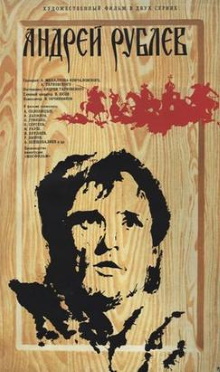This ought to be the last of Andrei Tarkovsky’s films as we’ve pretty much watched everything else. It’s also very different from his other works in that there seems to be less emphasis on the sheer visual beauty of each shot. Instead this film is more ambitious in scope and features several large scale scenes. The sheer density of themes in it is impressive but unfortunately that also means that there is more here for me to fail to understand or simply miss.
Across a span of some twenty years, the film recounts episodes from the life of Andrei Rublev, a skilled icon painter who lived in the 15-century. It begins with him leaving his monastery in the company of two others including Kirill who is envious of his talent to do more prestigious work in Moscow. Other notable episodes is his encounter with a group of pagans outside the city and subsequently his reluctance to paint the Last Judgment in a church in Vladimir as his views have become more humanistic. He also bears witness to tumultuous events when the brother of the Grand Duke colludes with a group of Tartars as an act of rebellion. They mount a devastating raid on Vladimir, pillaging, murdering and raping while Andrei takes refuge along with others in the church. Finally he also witnesses a young boy who steps up to take charge of the casting of a giant bell for the church, as part of the process of rebuilding.
As expected of a Tarkovsky film, this is a very long work and even though I tried to watch it very carefully, I only realized while reading up about it afterwards that I had missed so much of the details. For example I didn’t realize that the girl in the white robe during the bell scene is the same one who Andrei earlier saved and who subsequently left with a group of Tartars. It’s also difficult to grasp the philosophical implications of Andrei’s faith and key points of his conversation with Theophanes the Greek. There’s a whole lot going on here. I can appreciate the parts about artists having to work under state censorship, in this case the Grand Duke’s men literally blinding artisans who try to leave to work for his brother instead, and some of Andrei’s doubts about whether his work will endure and how it is used by the state. But the parts about the character of the Russian national identity and Christianity’s role in it definitely flew by me. I’m inclined to be charitable here and accept that it does have profoundly interesting themes that I can’t grasp instead of just being vacuous, but that still doesn’t mean that I can like it for that.
On the other hand, the large set-piece scenes are unquestionably spectacular. The raid on Vladimir is absolutely brutal, with so much unrestrained violence that I doubt it could be shot today, certainly not with the degree of animal torture and suffering that is depicted here. There is absolutely no glory in the fighting as the Tartars are shown happily massacring unarmed peasants who have no hope of fighting back whatsoever. Then there is the scene where they cast the church bell and you get a sense of just how much manpower and how much work is involved in the project in the absence of mechanization. There is much anticipation and tension in the air as the entire project rests on the efforts of one boy and everyone waits to see if the bell will actually ring. To me this feels like capturing the very moment of creation. On top of everything else, it seems that Tarkovsky wanted this to be a realistic depiction of life in medieval Russia and at this he certainly succeeded.
Even so, this is probably the Tarkovsky film that I like the least of the ones I’ve seen. Its scale is just too grand and too distant from the individual level insights that the other films excel in. It’s also less beautiful and too busy with so many things going and so many people running around. I’ll willing to bet that I would like it a lot more if I immersed myself in the history of the period and had a more personal connection to Christianity but I don’t and that would be way too much work. It is however very impressive that Tarkovsky was capable of works incorporating this kind of grand vision and sweeping ambition, in addition to the other skills that he is better known for.
